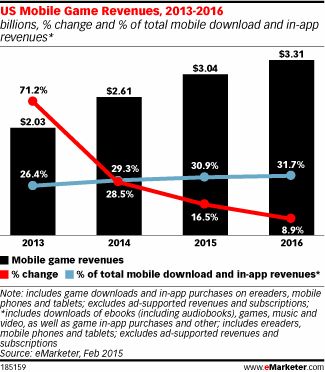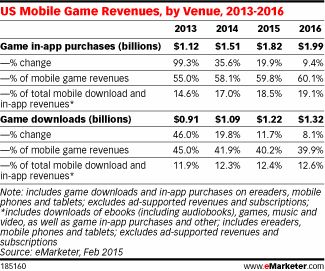Don’t question the continuing strength of the mobile game market, because it continues to outpace other parts of the app and mobile content business.
A report from eMarketer shows that US mobile game revenues will grow substantially this year, showing an increase of 16.5 percent up to an estimated $3.04 billion. With that, mobile games now account for 30.9 percent of the US mobile content market, a slight increase from the 29.3 percent reported last year.

While direct purchases are doing well, in-app purchases through free-to-play games are leading the charge. Revenues are expected to top $1.82 billion for the year, which accounts for more than half of all mobile game revenues. That number will grow even more to $2 billion next year, making its market share just over 60 percent.
Mobile content revenues in all are still quite healthy in the U.S., as these services, including eBooks and music, will total $9.82 billion by the end of this year, a 10.3 percent rise from 2014’s numbers. Mobile content revenues will also pick up an estimated 6.3 percent by next year, reaching over $10 billion and accounting for just over ten percent of all retail revenues for smartphones and tablets.
That said, not everything is thriving, as mobile content purchases have dropped a little bit. It hasn’t gotten to the point of saturation, though.
“Since mobile content is native to the devices, it’s often new mobile users’ first introduction to mCommerce,” said Martin Utreras, senior forecasting analyst for eMarketer. “As the US mobile user base matures, mobile content revenues are taking a smaller share of the overall mCommerce market as consumers become more comfortable buying physical retail items and making more expensive purchases from their devices.”

eBooks aren’t doing too shabby themselves, with sales expected to reach $4.25 billion this year, an estimated 43.3 percent of total mobile downloads and in-app revenues for the U.S. this year. Video download revenues will also pick up, showing an increase of 13.8 percent this year. And that’s likely to grow with services like HBO Go offering even more expansive services.

